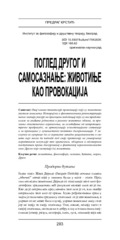Приказ основних података о документу
Pogled Drugog i samosaznanje: životinje kao provokacija
Gaze of the Other and self-knowledge: the animals as provocation
| dc.creator | Krstić, Predrag | |
| dc.date.accessioned | 2018-04-01T21:22:49Z | |
| dc.date.available | 2018-04-01T21:22:49Z | |
| dc.date.issued | 2017 | |
| dc.identifier.issn | 0023-5164 | |
| dc.identifier.uri | http://rifdt.instifdt.bg.ac.rs/123456789/1504 | |
| dc.description.abstract | Овај чланак тематизује провокацију коју су животињe упутиле мишљењу. Историјска и феноменолошка реконструкција њеног значаја указује на драгоцени подстицај који су оне предста вљале за увиђање јединства и разлике животних облика, за при знање епистемичких ограничења, за ослобађање од антропоцен тричке предрасуде, за артикулацију егзистенцијалне ситуације и за проницање у хуманистичке политике дискриминације. У закључку се сугерише да се огрешење западне рационалности о све што није могла да подведе под своју претензију на универзалну меродавност искупљује тек критичким, обзирним и одговорним поступањем према дискурзивној и фактичкој нерасположивости оног Другог које заступају (и) животиње. | sr |
| dc.description.abstract | Primarily relying on the texts of Jacques Derrida, Jean Baudrillard, Deleuze and Guattari and Theodor W. Adorno, this article contemplates the provocation that cats, often representative of animals in general, been able to direct us towards philosophy. Aside from the proverbial penetrativeness of the cat’s gaze which has a physiological cause, a historical and phenomenological reconstruction of its significance points to the valuable incentive that it has represented for the understanding both unity and singularity of life forms, the awareness of our epistemic limits, the release of anthropocentric prejudice, the articulation of existential situations and the insight into a humanistic policy of discrimination. The author concludes that the cat’s character, in its best literary and philosophical offshoots, warns of impingement that the Western rationality committed to everything that could not be included under its claim to universal authority, and suggests that the way of redemption for the wrongdoing leads across selective adoption and criticism of the same heritage, but now in such a manner that it could be considerate and responsible toward both discursive and the unavailability of the Others. | en |
| dc.language.iso | sr | sr |
| dc.rights | openAccess | sr |
| dc.rights.uri | https://creativecommons.org/licenses/by-nc-nd/4.0/ | |
| dc.source | Kultura | sr |
| dc.subject | животиња | sr |
| dc.subject | animals | sr |
| dc.subject | филозофија | sr |
| dc.subject | сазнање | sr |
| dc.subject | ћутање | sr |
| dc.subject | морал | sr |
| dc.subject | друго | sr |
| dc.subject | philosophy | sr |
| dc.subject | knowledge | sr |
| dc.subject | silence | sr |
| dc.subject | morals | sr |
| dc.subject | other | sr |
| dc.title | Pogled Drugog i samosaznanje: životinje kao provokacija | sr |
| dc.title | Gaze of the Other and self-knowledge: the animals as provocation | en |
| dc.type | article | sr |
| dc.rights.license | BY-NC-ND | sr |
| dcterms.abstract | Крстић, Предраг; Поглед Другог и самосазнање: животиње као провокација; Поглед Другог и самосазнање: животиње као провокација; | |
| dc.citation.issue | 154 | |
| dc.citation.spage | 283 | |
| dc.citation.epage | 299 | |
| dc.identifier.doi | 10.5937/kultura1754283K | |
| dc.type.version | publishedVersion | sr |
| dc.identifier.fulltext | http://rifdt.instifdt.bg.ac.rs/bitstream/id/3030/kultura.pdf |

